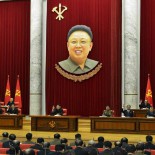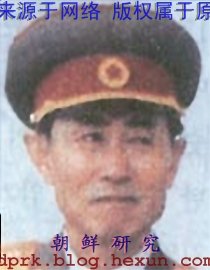Gen. Kim Tu-nam (1930-2009)
updated 18 January 2011
Kim Tu-nam was a member of the Party Central Military Commission [CMC], KPA General and close military adviser to Kim Chong-il. Prior to his death Kim was concurrently President of the Kumsusan Memorial Hall and chief of the Office of Military Officers in Kim Chong-il’s Personal Secretariat. Kim was the younger brother of Kim Yong-nam, the SPA Presidium President who discharges many of the DPRK’s head-of-state functions.
Kim Tu-nam was born in poverty in North Pyongan in 1930, the youngest of three brothers. His father was killed fighting in northeast China with Kim Il-song. In the early 1940s Kim worked in a chemical factory. After 1945, Kim attended the Mangyongdae School. He went on to attend the Kang Kon Military Officers’ School and the Hoeryong School for Military Cadres. In 1963, Kim Tu-nam went abroad to Russia where he received a professional military education at then-Soviet Military Academy. He returned to the DPRK in 1965 and was appointed guidance officer in the CC KWP Military Department. He was first elected a deputy (delegate) to the Supreme People’s Assembly to the 4th SPA in 1967.
In the 1970s as deputy director of the CC KWP Military Department, Kim Tu-nam was one of the Mangyongdae alums in the KPA leadership who facilitated the establishment of the monolithic ideological guidance system in the military. He was elected to the Party Central Committee [CC KWP] at the 6th Party Congress in 1980 and appointed director of the CC KWP Military Department. In 1982 he was elected a member of the CMC and alternate member of the CC KWP Political Bureau. He was promoted to General in April 1985. However, despite being elected to the 8th SPA, he was removed from his positions as director of the CC KWP Military Department, CMC Member and Political Bureau alternate.
Until the 1990s Kim served as a military adviser to Kim Il-song and Kim Chong-il. From 1995 until his death in March 2009 Kim Tu-nam served in concurrent positions as President of the Kumsusan Memorial Hall (where KIS’ lies in state) and Chief Military Officer (Office of Military Officers) in Kim Chong-il’s Personal Secretariat.
Kim Tu-nam had close social and political ties to a number of the early matriculates of the Mangyongdae School including Gen. O Kuk-yol and Col. Gen. Kim Kang-hwan. In the 1980s they constituted a formidable faction in the KPA leadership and were demoted or “revolutionized.” Kim was also a key military tutor and adviser to Kim Chong-il.
Kim Tu-nam had an energetic personality, although demanding and highly rigid.
Kim Tu-nam
KPA General
Former member, Central Military Commission [CMC]
Member, Party Central Committee [CC KWP]
President and director, Kumsusan Memorial Hall
Chief Military Officer, Kim Chong-il’s Personal Secretariat
Education:
Mangyongdae Revolutionary School
Kang Kon Military Officers’ School
Hoeryong Military Cadres’ School
Soviet Military Academy (Russia)
Positions held:
1965: Guidance Officer, CC KWP Military Department
1967: Deputy (delegate), 4th Supreme People’s Assembly [SPA]
1975: Deputy Director, CC KWP Military Department
1980: Elected, Member, CC KWP
Director, CC KWP Military Department
1982: Elected, Member, CMC and Alternate Member, CC KWP Political Bureau
Deputy, 7th SPA
1985: Promoted to General
1986: Deputy, 8th SPA
Removed from CMC and alternate on Political Bureau
Military Adviser to Kim Il-song
1990: Deputy, 9th SPA
1992: Awarded, Order of Kim Il-song
1994: Military Adviser to Kim Chong-il
Chief, Office of Military Officers
1995: President and director, Kumsusan Memorial Hall
1998: Deputy, 10th SPA
2003: Deputy, 11th SPA
See:
“Abbreviated Profiles of 200 DPRK Figures,” Singdong-A Seoul, January, 1995, pp 593-608
“Biographic Information on 100 Officials” Wolkan Kyonghang Seoul, January 1989 pp. 12-89
Gause, Ken. North Korean Civil-Military Trends: Military First Politics to a Point. (Carlisle, PA: Strategic Studies Institute USAWC, 2006)
Yonhap News Agency. North Korea Handbook (Armonk, NY: 2003)

